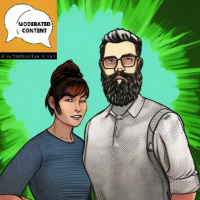Informações:
Sinopse
Podcast by Stanford Radio
Episódios
-
MC Weekly Update 6/19: The Landed Gentry
19/06/2023 Duração: 37minAlex and Evelyn discuss the Reddit blackout in response to its decision to start charging for API access; Dorsey confirming that India has threatened to shut down Twitter if it doesn't remove certain content; Spotify's Joe Rogan problem; Meta's new Covid-19 policies; and the latest round of DDoS attacks in state platform regulation legislation from Texas, Louisiana and Florida.
-
Best of - The future of robot simulations
16/06/2023 Duração: 28minHi everyone, Russ here, we’re running a best-of episode this week to re-share a conversation I had in 2021 with Karen Liu, an associate professor of computer science here at Stanford Engineering. The conversation is relevant today because, as we all know, AI is having a moment, and robotics is an important part of that. Karen and her lab have a goal of enabling robots to contribute in caregiving roles - think of tasks like helping medical patients get dressed each day - and they’re using physics-based simulations to do that. I hope you’ll take some time to tune into this discussion, it’s a timely and relevant one given larger societal conversations about AI. Enjoy!
-
An Investigation into Self-Generated Child Sexual Abuse Material Networks on Social Media
12/06/2023 Duração: 39minEvelyn and Alex talk to David Thiel and Renée DiResta, Alex's two co-authors on a report released by the Stanford Internet Observatory last week with findings from an investigation into the distribution of illicit sexual content by minors online. They talk about the findings, how social media companies should be and have been responding, and the public and political response to the report.
-
The future of wastewater
09/06/2023 Duração: 29minGuest Bill Mitch says it’s no secret the world is running short of fresh water. As a civil and environmental engineer, he sees wastewater as a potential solution, if only we can eliminate the impurities. Mitch designs systems to remove toxic chemicals from wastewater to enable its reuse as a drinking water supply. It’s not easy, but it costs half as much as desalinating seawater, Mitch tells host Russ Altman on this episode of Stanford Engineering’s The Future of Everything podcast.
-
MC Weekly Update 5/6: Good luck, Linda!
05/06/2023 Duração: 41minAlex and Evelyn cover a of stories you'd definitely want to hear on your first day as the CEO of Twitter: Twitter has been failing to remove dozens of known images of child sexual abuse, as revealed by an investigation by Stanford Internet Observatory; ad revenue is way down; Senators are concerned the company cannot comply with its obligations under the FTC consent decree; this is not helped by the fact it recently lost two high ranking trust and safety employees... and more! Good luck Linda! Meanwhile, YouTube is no longer enforcing its 2020 election misinformation policy; Instagram has reinstated RFK Jr's account; TikTok has been sharing user on an internal messaging tool accessible by ByteDance employees; and the Surgeon General issued an Advisory on Social Media and Youth Mental Health.
-
The future of greenhouse gases
02/06/2023 Duração: 29minGuest Matteo Cargnello approaches the challenge of greenhouse gases from a different perspective. He doesn’t study how harmful chemicals got in the skies, or even the consequences. Instead, Cargnello is using his skills as a chemical engineer to turn them into other benign or useful chemicals. So far, he’s turned greenhouse gases into valuable industrial chemicals, polymers, renewable fuels, and even ethanol. Useful products from greenhouse gases, that's the dream, Cargnello tells host Russ Altman on this episode of Stanford Engineering’sThe Future of Everything.
-
Best of - New forms of semiconductors are key to the future
27/05/2023 Duração: 28minThis episode of The Future of Everything podcast with Srabanti Chowdhury first ran in 2022. We’re sharing it again to offer a glimpse into research being done to identify new materials for semiconductors that could lead to smaller, faster, more powerful and more energy efficient electronics. Since we recorded this episode, the CHIPS and Science Act was signed into law, creating a $280 billion dollar investment in the field over the next 10 years, and in light of the renewed commitment to this technology, we’re excited to share this conversation on the future of semiconductor materials.
-
MC Weekly Update 5/22: Fizzers and Booms
22/05/2023 Duração: 39minAlex and Evelyn discuss the Supreme Court decisions in Gonzalez and Taamneh; Montana passing its state-wide TikTok ban and the immediate legal challenge filed against it; Meta's $1.3 billion dollar fine under the GDPR; OpenAI's charm offensive; and just another Monday at Twitter.
-
Ep 220 | The future of art
19/05/2023 Duração: 29minDeborah Cullinan’s job is to integrate arts of every form across campus. She says art has the power to heal and may be the answer to many of our present-day societal problems, such as growing political polarization and social isolation borne by the pandemic. Art advances equity, improves health, and enhances well-being for all, she says. Everyone should see themselves as artists—engineers, physicians, political scientists alike. "We all want to have creative lives," Cullinan tells host Russ Altman in this episode of Stanford Engineering’s The Future of Everything podcast.
-
MC Weekly Update 5/15: Turkish Non-delight
16/05/2023 Duração: 36minPlay the sad trombone 5 times for this week's Twitter Corner: Musk censors political content at the behest of the Turkish Government in the final days of a close and historically important election; Linda Yaccarino is announced as the new CEO; Tucker Carlson announces he's going to stream his new show to Twitter; the platform announces not-so-encrypted messaging; and continues its ad hominem content moderation practices. Also: Singapore, Pakistan, Russia all crack down on internet freedom, and the European Court of Human Rights releases a wild ruling holding politicians responsible for third-party comments on their Facebook pages.
-
Ep 219 | The future of movement disorders
12/05/2023 Duração: 31minHelen Bronte-Stewart is a neurologist and an expert in movement disorders, like Parkinson’s. She says new approaches, such as closed-loop deep-brain stimulation, and new digital health technologies that chart subtle changes in movement are reshaping the field, leading to new understandings and new treatments for this once-untreatable disease. To modulate behavior, you first have to measure it, Bronte-Stewart tells host Russ Altman. It’s the future of movement disorders in this episode of Stanford Engineering’s The Future of Everything podcast.
-
MC Weekly Update 5/8: Solving the Head of State Problem
08/05/2023 Duração: 28minAlex and Evelyn discuss Utah's new age verification law going into effect and the state's completely unrelated spike in VPN downloads; the horrific footage of the Allen Texas shooting on Twitter and how the understaffed platform is coping with one of the hardest content moderation challenges; but it's okay, Musk is focusing on other really important issues. Also, Meta's adversarial threat report (and Twitter's lack thereof); the 9th Circuit decision in a jawboning case brought by RFK Jr against Elizabeth Warren; the Brazilian government's latest attempts to limit internet freedom; and Bluesky's solution to the head of state content moderation dilemma.
-
EP 218 | The future of computational linguistics
05/05/2023 Duração: 32minOur guest, Christopher Manning, is a computational linguist. He builds computer models that understand and generate language using math. Words are the key component of human intelligence, he says, and why generative AI, like ChatGPT, has caused such a stir. We used to hope a model might produce one coherent sentence and suddenly ChatGPT is composing five-paragraph stories and doing mathematical proofs in rhyming verse, Manning tells host Russ Altman in this episode of Stanford Engineering’s The Future of Everything podcast.
-
MC Weekly Update 5/1: Flops and VLOPs
01/05/2023 Duração: 29minAlex and Evelyn talk about the totally unsurprising news that Twitter is complying with more government take-down orders under Musk and the very underwhelming "transparency report" they released this week. Also: the EU designated 19 platforms VLOPs and VLOSEs that will need to comply with the most onerous requirements under its new Digital Services Act; it looks like someone in Montana finally talked to a First Amendment lawyer, as the Governor requests changes to its TikTok ban bill; more bipartisan moral panic on the Hill with the Protecting Kids on Social Media Act; and Bluesky's trust and safety challenges ahead.
-
Best of - The future of computer science education
28/04/2023 Duração: 28minThis episode of The Future of Everything podcast with Mehran Sahami first ran in 2019. We’re sharing it again to offer a glimpse into the ways our faculty are thinking about computer science education, an increasingly popular and impactful field of study. Earlier this week, Sahami and another of his colleagues, Chris Piech, launched the third offering of Code In Place, a free online course that offers coding education to people all over the world.
-
MC Weekly Update: Elon Musk JD Program False Advertising Unit
24/04/2023 Duração: 44minFirst up, Stanford's Riana Pfefferkorn joins the show to give an update on two child safety bills on the Hill. Then Alex and Evelyn discuss the DOJ's charges against members of a Chinese troll farm; Prof. Alexandra Roberts from Northeastern University weighs in on the Blue Checkmark Fiasco and possible legal claims that could follow; in a great sign for 2024, Twitter has stopped labelling "state-affiliated" media and Meta layed off a lot of people from its information operations investigations team; the Meta Oversight Board delivered a shruggie emoji of an opinion about Meta's COVID-19 policies; and the Supreme Court granted cert to hear two cases about whether and when government actors can block people on their social media accounts.
-
E216 | The future of simple rules
21/04/2023 Duração: 27minAn expert in corporate decision making explains why companies that follow fewer and simpler rules are often the best innovators. Kathleen Eisenhardt is an expert in strategy and organizational behavior. She studies corporate decision making. She says the most creative companies are like jazz bands. Bound by a few simple rules, they are able to innovate continually. Other companies are like orchestras, tied to rigid scores and complex rules; they find it hard to improvise. If innovation is your metric, Eisenhardt says, having a few simple rules is the best path to success, as she tells host Russ Altman on this episode of Stanford Engineering’s The Future of Everything podcast.
-
MC Weekly Update 4/17: TikTok Boom!
18/04/2023 Duração: 43minAlex and Evelyn are joined by John Perrino to discuss Montana's TikTok ban bill, passed this week, and other things to watch on the TikTok front. Then they discuss why people's ideas to content moderate away the Discord leaks problem won't work; Substack's ill-thought-out thoughts on content moderation; a blog post from Twitter that seems to have slipped through a wormhole from the past; an important case the Supreme Court is hearing this week that could have big ramifications for protections against online stalking; and much more.
-
E215 | The future of proteins
14/04/2023 Duração: 31minAn expert in protein structure and function explains how rapidly evolving study of these complex molecules is revealing ever-greater understanding of human life. While DNA may be the blueprint of life, proteins are the workhorses, says Polly Fordyce, a bioengineer, explaining how one of her favorites, kinesin, “walks” in 8-nanometer steps transporting chemical cargo through the body. More remarkable still, Fordyce says, kinesin is just one among thousands of “incredible” proteins that make life happen, as she tells host Russ Altman on this episode of Stanford Engineering’s The Future of Everything podcast.
-
MC Weekly Update 4/10: Leopards Eat Faces
11/04/2023 Duração: 30minAlex and Evelyn discuss what was a ridiculous week for Twitter, even by its new standards: Germany is threatening to fine it over poor content moderation of illegal content; it made a hash of state-affiliated media labelling; and got into a fight with Substack. Meanwhile, India continues its forward march in cracking down on the internet; everything is a content moderation story, including the recently leaked US intelligence documents; and Arkansas is the latest state to join the "won't you think of the children" bandwagon.




























